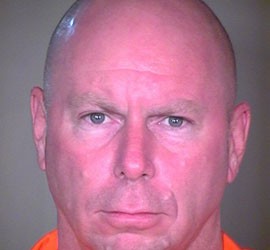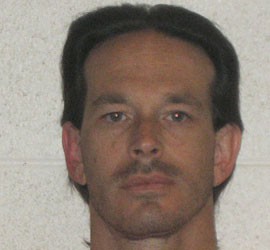Cronkite News has moved to a new home at cronkitenews.azpbs.org. Use this site to search archives from 2011 to May 2015. You can search the new site for current stories.
Federal appeals ruling gives rest-stop killer another day in court
WASHINGTON – A divided federal appeals court Friday ruled that lower courts did not act unreasonably or erroneously when they convicted Gregory Scott Dickens in two 1991 rest-stop murders east of Yuma.
But the three-judge panel of the 9th U.S. Circuit Court of Appeals did order a new hearing for the death-row inmate, saying he should be allowed to raise arguments that he was poorly represented by his attorney at sentencing.
Dickens said that lawyer failed to raise his defense of fetal alcohol syndrome – that his mother’s drinking while pregnant caused his mental impairment – and that he had additional organic brain damage.
In a sharply worded dissent, Circuit Judge Stephen Reinhardt disagreed, saying the basis of the conviction was faulty and that the state was going to “execute Dickens essentially for being the getaway driver.” The Supreme Court has said that’s unconstitutional, he wrote.
Neither attorney in the case could be reached to comment on the ruling Friday.
Dickens, 47, was sentenced to death for his part in the murders of Bryan and Laura Bernstein, who were on their way to graduate school in California when they stopped at an Interstate 8 rest stop east of Yuma shortly after 9 p.m. on Sept. 10, 1991.
Dickens and his then-16-year-old accomplice, Travis Amaral, had been waiting at the rest stop for three hours, looking for someone to rob. When Dickens saw the Bernsteins pull into the rest stop across the interstate, he nodded his head and handed Amaral a handgun, according to court documents.
While Dickens waited in his truck, Amaral approached the couple and asked for the time, then pointed the gun at them. He took Bryan’s wallet and then, after telling them to turn around, asked if they were ready to die. Amaral shot Laura point-blank in the head and then shot Bryan as he crouched over his wife.
After hearing the shots and seeing the muzzle flash, Dickens picked up Amaral and they drove to Dicken’s brother’s home, where they burned the wallet after removing cash, traveler’s checks and one credit card. They parted ways the next day.
A half-hour after the shooting, a deputy sheriff came to the rest stop where he found Laura dead and Bryan “moaning, thrashing, and rolling around” in pain. Bryan was able to tell the deputy what happened, but died shortly thereafter.
The case was unsolved for six months until Amaral ran away from home in March 1992 and his mother pointed police to Dickens.
California police subsequently began investigating Dickens on sex-abuse charges and interviewed Amaral, who met Dickens while a resident of a center for violent juveniles where Dickens worked. During that interview, Amaral confessed that he and Dickens were involved in the double homicide in Yuma.
Dickens and Amaral were convicted in separate trials in 1993. Dickens was sentenced to death, and Amaral, now 37, was sentenced to life in prison.
On appeal, Dickens claimed that lower courts based their decisions on an “unreasonable” reading of the facts and that his contribution to the murders “was insufficient to warrant the death penalty.”
The appellate judges disagreed, saying that even though he was not present for the shootings, he had planned the robbery with Amaral, gave a gun to an “explosive adolescent with a history of violence” and refused to help the victims.
They did agree with Dickens’ argument, however, that his claim of ineffective counsel at sentencing should not have been rejected at the federal level because he was barred from bringing it up in his state appeals. They ordered the case back to the district court reconsideration on that one issue.
But Reinhardt did not get to that question, saying in his dissent that Dickens’ first claims were valid. He said the facts of the case did not support the charge that Dickens was a major participant in the murders, even though the lower courts, and the rest of the circuit panel, said they did.
“It is clear … that Dickens is not one of the ‘most culpable and dangerous of murderers’ such that he should be put to death by the state of Arizona,” he wrote.








